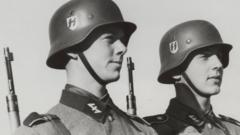Hemingway, known for his role in defending Britain during World War II, passed away in Dublin, marking the end of an era for the "Few" who fought valiantly against Nazi forces.
**John A. Hemingway, Last Pilot from the Battle of Britain, Passes Away at 105**

**John A. Hemingway, Last Pilot from the Battle of Britain, Passes Away at 105**
In a historic tribute, the last surviving pilot of the Battle of Britain, John A. Hemingway, has died, leaving behind a legacy of bravery.
John A. Hemingway, revered as the final known survivor of the legendary "few," has passed away at the age of 105 in Dublin. Known affectionately as Paddy, he was one of the courageous Royal Air Force (RAF) pilots who fought valiantly during the critical Battle of Britain, which took place between July 10 and October 31, 1940. This battle was a pivotal moment in World War II as it thwarted Adolf Hitler's plans for an invasion of the British Isles known as Operation Sea Lion.
In a heartfelt tribute, British Prime Minister Winston Churchill famously praised the pilots in the House of Commons in August 1940, stating, “Never in the field of human conflict was so much owed by so many to so few.” Hemingway’s contributions came during a time when the RAF was significantly outmatched, having only 749 aircraft compared to the Luftwaffe's 2,550. Despite the odds, the RAF successfully defended British skies, delaying the German invasion indefinitely.
Hemingway flew Hurricane fighters during the battle and demonstrated remarkable resilience, having been shot down four times between 1940 and 1945. His bravery earned him the Distinguished Flying Cross in July 1941 for his success in downing and damaging enemy planes. The Blitz, a relentless campaign of bombings led by Germany against British cities, continued into the spring of 1941, maintaining the urgency and significance of the RAF's efforts.
The world remembers John A. Hemingway not only for his extraordinary service as a pilot but also as a symbol of resilience for a nation during its darkest days. His passing marks a solemn chapter in history, honoring the legacy of those who fought to preserve freedom during one of the most challenging periods in modern history.
In a heartfelt tribute, British Prime Minister Winston Churchill famously praised the pilots in the House of Commons in August 1940, stating, “Never in the field of human conflict was so much owed by so many to so few.” Hemingway’s contributions came during a time when the RAF was significantly outmatched, having only 749 aircraft compared to the Luftwaffe's 2,550. Despite the odds, the RAF successfully defended British skies, delaying the German invasion indefinitely.
Hemingway flew Hurricane fighters during the battle and demonstrated remarkable resilience, having been shot down four times between 1940 and 1945. His bravery earned him the Distinguished Flying Cross in July 1941 for his success in downing and damaging enemy planes. The Blitz, a relentless campaign of bombings led by Germany against British cities, continued into the spring of 1941, maintaining the urgency and significance of the RAF's efforts.
The world remembers John A. Hemingway not only for his extraordinary service as a pilot but also as a symbol of resilience for a nation during its darkest days. His passing marks a solemn chapter in history, honoring the legacy of those who fought to preserve freedom during one of the most challenging periods in modern history.


















